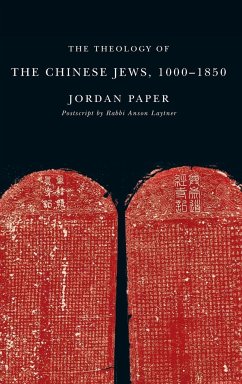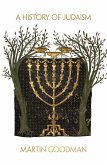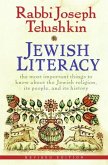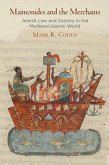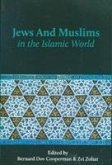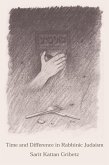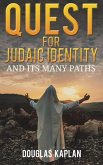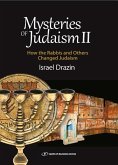Jordan Paper
The Theology of the Chinese Jews, 1000a 1850
Jordan Paper
The Theology of the Chinese Jews, 1000a 1850
- Gebundenes Buch
- Merkliste
- Auf die Merkliste
- Bewerten Bewerten
- Teilen
- Produkt teilen
- Produkterinnerung
- Produkterinnerung
Traces the history of Jews in China and explores how their theology's focus on love, rather than on the fear of a non-anthropomorphic God, may speak to contemporary liberal Jews.
Andere Kunden interessierten sich auch für
![A History of Judaism A History of Judaism]() Martin GoodmanA History of Judaism22,99 €
Martin GoodmanA History of Judaism22,99 €![Jewish Literacy Revised Ed Jewish Literacy Revised Ed]() Joseph TelushkinJewish Literacy Revised Ed49,99 €
Joseph TelushkinJewish Literacy Revised Ed49,99 €![Maimonides and the Merchants Maimonides and the Merchants]() Mark R. CohenMaimonides and the Merchants85,99 €
Mark R. CohenMaimonides and the Merchants85,99 €![Jews and Muslims in the Islamic World Jews and Muslims in the Islamic World]() Jews and Muslims in the Islamic World42,99 €
Jews and Muslims in the Islamic World42,99 €![Time and Difference in Rabbinic Judaism Time and Difference in Rabbinic Judaism]() Professor Sarit Kattan GribetzTime and Difference in Rabbinic Judaism40,99 €
Professor Sarit Kattan GribetzTime and Difference in Rabbinic Judaism40,99 €![Quest for Judaic Identity Quest for Judaic Identity]() Douglas KaplanQuest for Judaic Identity9,49 €
Douglas KaplanQuest for Judaic Identity9,49 €![Mysteries of Judaism II Mysteries of Judaism II]() Israel DrazinMysteries of Judaism II18,99 €
Israel DrazinMysteries of Judaism II18,99 €-
-
-
Traces the history of Jews in China and explores how their theology's focus on love, rather than on the fear of a non-anthropomorphic God, may speak to contemporary liberal Jews.
Hinweis: Dieser Artikel kann nur an eine deutsche Lieferadresse ausgeliefert werden.
Hinweis: Dieser Artikel kann nur an eine deutsche Lieferadresse ausgeliefert werden.
Produktdetails
- Produktdetails
- Verlag: Wilfrid Laurier University Press
- Seitenzahl: 175
- Erscheinungstermin: 21. Februar 2012
- Englisch
- Abmessung: 230mm x 150mm x 16mm
- Gewicht: 374g
- ISBN-13: 9781554583720
- ISBN-10: 1554583721
- Artikelnr.: 33811857
- Herstellerkennzeichnung
- Libri GmbH
- Europaallee 1
- 36244 Bad Hersfeld
- 06621 890
- Verlag: Wilfrid Laurier University Press
- Seitenzahl: 175
- Erscheinungstermin: 21. Februar 2012
- Englisch
- Abmessung: 230mm x 150mm x 16mm
- Gewicht: 374g
- ISBN-13: 9781554583720
- ISBN-10: 1554583721
- Artikelnr.: 33811857
- Herstellerkennzeichnung
- Libri GmbH
- Europaallee 1
- 36244 Bad Hersfeld
- 06621 890
Jordan Paper is a professor emeritus at York University (East Asian and Religious Studies) and a fellow at the Centre for Studies in Religion and Society at the University of Victoria. He studied Buddhist Chinese at and received his doctorate in Chinese Language and Literature from the University of Wisconsin (Madison). His many books on religion and Chinese philosophy include The Fu-Tzu: A Post-Han Confucian Text, The Spirits Are Drunk: Comparative Approaches to Chinese Religion, The Chinese Way in Religion (2nd edition), and The Mystic Experience: A Descriptive and Comparative Approach.
Table of Contents for
The Theology of the Chinese Jews, 1000-1850 by Jordan Paper
Prologue
Acknowledgments
Chapter 1: Introduction: The Four Questions
Who Are the Chinese Jews?
Are the Chinese Jews Jewish?
What Are the Sources for the Theology of the Chinese Jews?
Is This Theology Relevant Today?
Chapter 2: From Whence They Came to Where They Went
The Extent of the Diaspora
Jewish Life under Christianity and Islam: Tenth to Twelfth Centuries
The Sea Route to China and the Settlement in Kaifeng
Chapter 3: Life in China: Tenth to Nineteenth Centuries
Religion
Education
Social Structure
Government
Economy
Culture
Chapter 4: Brief History of Buddhism and the Abrahamic Traditions in China
The Buddhist Experience in China
Christianity to the Mid-Nineteenth Century
Christianity in China after the de Facto Demise of Judaism
Islam
Judaism
Chapter 5: The Sinification of Judaism
Veneration of Ancestors: Family, Tribal, Religious, and Cultural
Education and Its Relationship to Judaism
The Kaifeng Jews and Their Neighbours
Chinese Judaism
Chapter 6: A Speculative Theology of the Chinese Jews
The Names of God: Hebrew
The Kaifeng Synagogue's Stelae and Plaques
The Names of God: Chinese
The Nature of Creation
Monotheism from a Chinese Perspective
A Speculative Chinese-Jewish Theology
Assimilation and Theology
Historical and Cultural Context
Epilogue
Postscript: What Western Jews Can Learn from the Kaifeng Jews Rabbi Anson
Laytner
Appendix: Chinese Logographs for Terms and Translations in Chapter 6
Notes
References
The Theology of the Chinese Jews, 1000-1850 by Jordan Paper
Prologue
Acknowledgments
Chapter 1: Introduction: The Four Questions
Who Are the Chinese Jews?
Are the Chinese Jews Jewish?
What Are the Sources for the Theology of the Chinese Jews?
Is This Theology Relevant Today?
Chapter 2: From Whence They Came to Where They Went
The Extent of the Diaspora
Jewish Life under Christianity and Islam: Tenth to Twelfth Centuries
The Sea Route to China and the Settlement in Kaifeng
Chapter 3: Life in China: Tenth to Nineteenth Centuries
Religion
Education
Social Structure
Government
Economy
Culture
Chapter 4: Brief History of Buddhism and the Abrahamic Traditions in China
The Buddhist Experience in China
Christianity to the Mid-Nineteenth Century
Christianity in China after the de Facto Demise of Judaism
Islam
Judaism
Chapter 5: The Sinification of Judaism
Veneration of Ancestors: Family, Tribal, Religious, and Cultural
Education and Its Relationship to Judaism
The Kaifeng Jews and Their Neighbours
Chinese Judaism
Chapter 6: A Speculative Theology of the Chinese Jews
The Names of God: Hebrew
The Kaifeng Synagogue's Stelae and Plaques
The Names of God: Chinese
The Nature of Creation
Monotheism from a Chinese Perspective
A Speculative Chinese-Jewish Theology
Assimilation and Theology
Historical and Cultural Context
Epilogue
Postscript: What Western Jews Can Learn from the Kaifeng Jews Rabbi Anson
Laytner
Appendix: Chinese Logographs for Terms and Translations in Chapter 6
Notes
References
Table of Contents for
The Theology of the Chinese Jews, 1000-1850 by Jordan Paper
Prologue
Acknowledgments
Chapter 1: Introduction: The Four Questions
Who Are the Chinese Jews?
Are the Chinese Jews Jewish?
What Are the Sources for the Theology of the Chinese Jews?
Is This Theology Relevant Today?
Chapter 2: From Whence They Came to Where They Went
The Extent of the Diaspora
Jewish Life under Christianity and Islam: Tenth to Twelfth Centuries
The Sea Route to China and the Settlement in Kaifeng
Chapter 3: Life in China: Tenth to Nineteenth Centuries
Religion
Education
Social Structure
Government
Economy
Culture
Chapter 4: Brief History of Buddhism and the Abrahamic Traditions in China
The Buddhist Experience in China
Christianity to the Mid-Nineteenth Century
Christianity in China after the de Facto Demise of Judaism
Islam
Judaism
Chapter 5: The Sinification of Judaism
Veneration of Ancestors: Family, Tribal, Religious, and Cultural
Education and Its Relationship to Judaism
The Kaifeng Jews and Their Neighbours
Chinese Judaism
Chapter 6: A Speculative Theology of the Chinese Jews
The Names of God: Hebrew
The Kaifeng Synagogue's Stelae and Plaques
The Names of God: Chinese
The Nature of Creation
Monotheism from a Chinese Perspective
A Speculative Chinese-Jewish Theology
Assimilation and Theology
Historical and Cultural Context
Epilogue
Postscript: What Western Jews Can Learn from the Kaifeng Jews Rabbi Anson
Laytner
Appendix: Chinese Logographs for Terms and Translations in Chapter 6
Notes
References
The Theology of the Chinese Jews, 1000-1850 by Jordan Paper
Prologue
Acknowledgments
Chapter 1: Introduction: The Four Questions
Who Are the Chinese Jews?
Are the Chinese Jews Jewish?
What Are the Sources for the Theology of the Chinese Jews?
Is This Theology Relevant Today?
Chapter 2: From Whence They Came to Where They Went
The Extent of the Diaspora
Jewish Life under Christianity and Islam: Tenth to Twelfth Centuries
The Sea Route to China and the Settlement in Kaifeng
Chapter 3: Life in China: Tenth to Nineteenth Centuries
Religion
Education
Social Structure
Government
Economy
Culture
Chapter 4: Brief History of Buddhism and the Abrahamic Traditions in China
The Buddhist Experience in China
Christianity to the Mid-Nineteenth Century
Christianity in China after the de Facto Demise of Judaism
Islam
Judaism
Chapter 5: The Sinification of Judaism
Veneration of Ancestors: Family, Tribal, Religious, and Cultural
Education and Its Relationship to Judaism
The Kaifeng Jews and Their Neighbours
Chinese Judaism
Chapter 6: A Speculative Theology of the Chinese Jews
The Names of God: Hebrew
The Kaifeng Synagogue's Stelae and Plaques
The Names of God: Chinese
The Nature of Creation
Monotheism from a Chinese Perspective
A Speculative Chinese-Jewish Theology
Assimilation and Theology
Historical and Cultural Context
Epilogue
Postscript: What Western Jews Can Learn from the Kaifeng Jews Rabbi Anson
Laytner
Appendix: Chinese Logographs for Terms and Translations in Chapter 6
Notes
References

